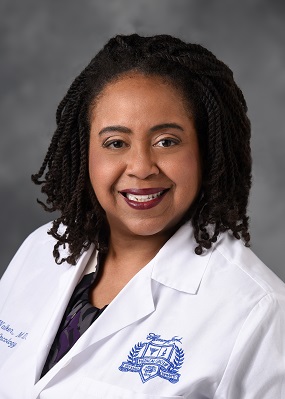Henry Ford Cancer Institute Receives Grant to Reduce Prostate Cancer Disparities Among Black Men

$250,000 grant funded by Pfizer Global Medical Grants and overseen by the American Cancer Society is Aimed at Reducing Gaps in Care and Barriers to Treatment
DETROIT (April 21, 2021) – Henry Ford Cancer Institute has received a $250,000 grant from Pfizer Global Medical Grants and the American Cancer Society to reduce prostate cancer disparities among Black men. While all men are at risk for prostate cancer, Black men are at an increased risk for developing and dying from prostate cancer.
“Black men tend to develop prostate cancer at a younger age, have more advanced disease when diagnosed, and are twice as likely to die from prostate cancer versus men of other races and ethnicities,” said Eleanor M. Walker, M.D., director of Breast Radiation Oncology and medical director of Integrative Services at Henry Ford Cancer Institute. “These disparities are complex and multifactorial, with contributing factors that range from access to care, to genetics, environment, lifestyle and more. With the support of Pfizer and the American Cancer Society, in addition to our experience serving the diverse communities of Detroit and Southeast Michigan, we are uniquely positioned at Henry Ford to reduce these disparities with the goal of one day eliminating them altogether.”
In a highly competitive process, each grant applicant was asked to provide solutions to local problems across the cancer continuum. Pfizer and ACS also awarded grants to health systems in Massachusetts, Florida, Georgia, Washington, D.C., and Pennsylvania, with Henry Ford Health System being the sole recipient in Michigan.
“Addressing prostate cancer disparities is critical to the mission of promoting health equity in Detroit and Southeast Michigan. We look forward to following the success of this project as it identifies the factors that contribute to these disparities and develops effective ways to reduce or eliminate them,” said Kathleen Goss, Ph.D., vice president of Cancer Control in the North Central Region for the American Cancer Society.
Recently, Henry Ford launched a project aimed at dramatically improving representation of the Black community and other minorities in cancer clinical trials. Funded by a grant from Genentech and known as the Participatory Action for Access to Clinical Trials (PAACT) project, this community-based research initiative is a collaboration with the Detroit Community-Academic Urban Research Center (Detroit URC) that will address various barriers to trust and participation in clinical trials. Dr. Walker, who serves as co-investigator of the PAACT project, believes these initiatives will advance the health system’s efforts to address cancer disparities within the Black and other minority communities, and in doing so, create greater equity in healthcare.
Depending upon the stage, prostate cancer may be treated with active surveillance, surgery, radiation therapy, hormone therapy, chemotherapy, or immunotherapy. Henry Ford Health System is a national leader in minimally-invasive robotic surgery for prostate cancer and performed some of the first robotic prostate surgeries in the country. Since 2001, Henry Ford has used robot-assisted techniques to improve outcomes for people with prostate and other forms of cancer. Minimally invasive robotic procedures are often more effective and result in fewer complications, allowing patients to recover more quickly after surgery.
To learn more about prostate cancer treatment at Henry Ford, visit henryford.com/ProstateCancer.
###
About Henry Ford Health System
Founded in 1915 by Henry Ford himself, Henry Ford Health System is a non-profit, integrated health system committed to improving people’s lives through excellence in the science and art of healthcare and healing. Henry Ford Health System includes Henry Ford Medical Group, with more than 1,900 physicians and researchers practicing in more than 50 specialties at locations throughout Southeast and Central Michigan. Acute care hospitals include Henry Ford Hospital in Detroit, MI and Henry Ford Allegiance Health in Jackson, MI – both Magnet® hospitals; Henry Ford Macomb Hospital; Henry Ford West Bloomfield Hospital; and Henry Ford Wyandotte Hospital.
The largest of these is Henry Ford Hospital in Detroit, a quaternary care research and teaching hospital and Level 1 Trauma Center recognized for clinical excellence in cardiology, cardiovascular surgery, neurology, neurosurgery, and multi-organ transplants. The health system also provides comprehensive, best-in-class care for cancer at the Brigitte Harris Cancer Pavilion, and orthopedics and sports medicine at the William Clay Ford Center for Athletic Medicine – both in Detroit.
As one of the nation’s leading academic medical centers, Henry Ford Health System annually trains more than 3,000 medical students, residents, and fellows in more than 50 accredited programs, and has trained nearly 40% of the state’s physicians. Our dedication to education and research is supported by nearly $100 million in annual grants from the National Institutes of Health and other public and private foundations.
Henry Ford’s not-for-profit health plan, Health Alliance Plan (HAP), provides health coverage for more than 540,000 people.
Henry Ford Health System employs more than 33,000 people, including more than 1,600 physicians, more than 6,600 nurses and 5,000 allied health professionals.
MEDIA CONTACT: Jeff Adkins / (586) 307-2027 / jadkins6@hfhs.org
.svg?iar=0&hash=F6049510E33E4E6D8196C26CCC0A64A4)

/hfh-logo-main--white.svg?iar=0&hash=ED491CBFADFB7670FAE94559C98D7798)









